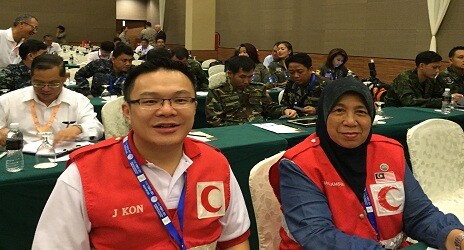
Boats and trucks were overturned, resulting in deadly pile ups across motorways and an oil spill in the Andaman Sea. Buildings collapsed, hundreds of people were trapped in rising flood waters, and thousands more were forced to evacuate their homes due to flooding and seek refuge in evacuation camps. Help poured in from across the region to support the overwhelmed Malaysian authorities, who had welcomed outside assistance in the early days following the typhoon’s landfall. In response to this cry for help, China deployed hundreds of military personnel and assets to support the relief operations, as did ASEAN neighbours, India and the US. The United Nations and regional agencies were mobilised and the International Red Cross and Red Crescent Movement were there supporting Malaysian Red Crescent in its humanitarian response.
How, you may be wondering, did you not know about this and why was such an event not gracing the global headlines? Well, the truth is … it was fake. Last week’s events were part of the ASEAN Regional Forum Disaster Relief Exercise 2015 (ARF DiREx 2015) co-organized by the Government of Malaysia and the Government of the People’s Republic of China. This biennial simulation event is designed to strengthen disaster response coordination mechanisms between the 27 ASEAN Regional Forum countries and international humanitarian players. This was the fourth time such an event has been held and attracted the biggest crowd yet with over 2000 foreign participants from across the region and beyond.
Malaysia, as current ASEAN Chair played host to this year’s event which provided a golden opportunity for Malaysian authorities to test out its national disaster response mechanisms and procedures as outlined in Directive 20 (the standard operating procedures for disaster management in Malaysia). Not only were they testing national and local coordination mechanisms, but also how the international and regional systems fit into the equation, particularly how regional arrangements laid out in the AADMER (ASEAN agreement on disaster management and emergency response) would be operationalised and the role of the international humanitarian system in such a major disaster operation.
The event comprised three different components – a table top exercise to test policy and strategic considerations, the field training exercise where the scenario was brought to life and also an after action review to support future learnings and recommendations to strengthen future simulation events. Malaysia Red Crescent played an active role across all areas, reflecting its auxiliary role and profiling its growing capacities in the area of water and sanitation and radio communications, as well as its more traditional activities of mass cooking, which was no mean feat with 3000 meals being prepared and served six times a day. Sister Red Cross societies from Thailand, Indonesia and Lao also travelled to support Malaysian Red Crescent in its water and sanitation activities.
IFRC is well known for its work on disaster law in the region and was invited to present on common legal issues that occur in large scale response operations during the table top exercise. Asia Pacific Zone Director, Jagan Chapagain, urged participating ARF countries to examine their domestic laws and policies for disaster management to ensure they are fit for purpose. The recent earthquake in Nepal, he said, “should serve as a wake-up call to all countries in the Asia Pacific to update and implement their own disaster laws and policies before it is too late. It doesn’t matter how big, how rich or how prepared you are, there may be a time when you will need the international community to support you in your relief and recovery efforts. The absence of clear laws and rules to guide this, can lead to bureaucratic bottlenecks and unnecessary confusion and complication and slows down live saving assistance getting to the people who need it.”
Although Malaysia does not experience disasters as frequently as some of its South East Asian neighbours, the recent dramatic floods in the east coast of the country show that Malaysia is by no means immune from weather related events. Furthermore, the impacts of climate change in the region means that such events will likely increase in both frequency and intensity and authorities are cognisant that more investment is needed in the disaster management infrastructure of the country – including developing a disaster management law.
Exercises such as the ARF Direx provide an important platform to test all these arrangements, share ideas and better understand roles and responsibilities amongst all disaster responders. Fingers crossed that if/when the “real one” does hit, the national and international systems will be able to put some of the learnings from the exercise into practice.